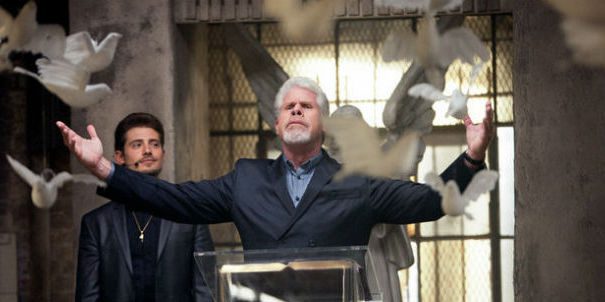… is that the man behind Ron Perlman’s arm may be wearing a clerical collar (but not a crucifix). He’s certainly wearing one when he first appears in the pilot of “Hand of God,” the new drama from Amazon Studios. But he’s not a Catholic priest; he’s Rev. Paul (Julian Morris), a charismatic preacher with a wife (Elizabeth McLaughlin) who’s willing to have sex with other men in order to get money for their “Hand of God” ministry.
Created by Ben Watkins (“Burn Notice”), “Hand of God” was made available for viewing on Friday, Sept. 4, to subscribers of Amazon’s Prime Instant Video service.
Perlman plays Judge Pernell Harris, and the series opens with him standing naked in a fountain, speaking in tongues. Over the course of the pilot, we discover that he’s had a religious awakening after being “born again” at Rev. Paul’s storefront church (red neon cross and all). Pernell was in a vulnerable place in the wake of the attempted suicide of his adult son, P.J., now in a coma.
Pernell starts receiving messages and seeing visions — the series doesn’t outright say whether they’re from God or from Pernell’s own troubled psyche — and sets out to solve the crime that caused his son to try to take his life. His crusade to find the masked man who burst into his son’s home and forced him to watch his wife (Alona Tal) being raped may cost Pernell his own wife (Dana Delany), sanity and career, but he claims he’s on a mission from God.
Meanwhile, there’s an ex-con called KD (Garret Dillahunt, “Deadwood,” “Raising Hope”) who balances Biblical devotion with explosions of violence. Pernell lets him off easy on an assault in jail, and KD wind up helping Pernell in his quest.
As to the point of view of the series, or lack thereof, Watkins addressed that at the biannual TV Critics Association Press Tour in Beverly Hills earlier this summer. Asked if the show was depicting the supernatural or insanity, he said:
That’s a great question. For me, one of the things that’s really important in terms of storytelling and with this story in particular is I’m fascinated with the ‑‑ what I consider the concept that more than one thing can be true at once. And when we deal with themes in “Hand of God,” the approach we wanted to take is that the answer can be one or the other. The answer could be multiple things. I wanted to give fodder for both sides of it. And that puts the audience in the position where they have to draw the conclusions. And I’m really interested to see how that happens because then the answer is different for everyone, and it’s really based on their beliefs, how they were brought up, and their agendas.
Once again, we see a TV writer playing with the outer forms of religion. He also makes dimwitted errors, like putting a white millennial storefront evangelist in black clerical garb. In my experience, they usually look like high-end salesmen or hipsters. About the last thing they’d ever think of wearing is anything a Catholic priest would wear.
Watkins also leans heavily on the hypocrisy and seedier aspects of the practice of (Protestant/megachurch) Christianity, while seemingly lacking a gut understanding of the uplifting, ennobling — and truly supernatural — aspects of the Faith itself.
Said, of all outlets, The New York Times:
The way the show handles faith and obsession could be criticized (rightly) for being superficial and sensationalistic, but that would be beside the point. No matter how seriously Mr. Watkins took the religious themes, they function as plot devices, a way to stage-manage the characters into acts and decisions that otherwise wouldn’t make much sense.
In an interview, Watkins said that he was determined to overcome objections to the religious elements, but said:
And so you have a show where the main character thinks that God is talking to him and another main character is a preacher, but the show itself is not actually about religion. One of the reasons that I make religion prominent in the show is because it’s one part of our society that is full of hypocrisy. Some people who say they believe in God don’t necessarily act that way, and then some people who don’t believe in God have a sense that there’s something unexplained out there but they’re not trying to explore that.
But Watkins does say something else that’s interesting:
… one of the ideas is these really popular preachers with huge mega-churches, and then they’ll have a fall from grace. You could say that person was always a liar and a hypocrite, but just the day before you were following the person devoutly. And for me, the truth is that person is good and bad at the same time. Ted Haggard, the preacher who ended up having an affair with a gay prostitute – when you find out this thing about him, do you throw everything out the window? Does he just become that preacher who’s been lying all this time, or is he still the guy that his followers felt was great? To me it’s a fascinating question.
Instead of accepting a more complicated reality, we usually want to make it a yes or no answer.
But the series doesn’t ultimately live up to this intriguing idea. This may be part of the reason. In another interview, Watkins said:
To people who might decide not to sample the series simply because of the religious element included in it, Watkins says, “If you write it off that quickly, I feel sorry for you. Religion is a hot button issue but I want to remind people that the religion in this show is no different than the drugs in Breaking Bad. Yes, Walter White was in the drug business, but would you say the show is about drugs? No. It’s about the man and his family. It’s the same here. We bring up questions about a lot of things – race, politics, right to die, and, yes, religion, but we’re not making statements. We’re saying there’s no right or wrong – a lot of times things that happen are both right and wrong. That’s more reflective of what our lives are like. It puts us out of our comfort zone to say that, but it’s true. If you think you’re going to see an edgier version of Touched by an Angel, you’re going to be disappointed, but if you think you’re going to see a show that definitively says there’s no God, you’re going to be disappointed as well.”
“Hand of God” is well-made and has an impressive cast, but it’s also dark and dour and ultimately unsatisfying. Perhaps if Watkins had not only been focusing on self-aggrandizing celebrity preachers but also reading the lives of Catholic saints, he might have had a more balanced view of Christ and His Church.
The minute I saw Rev. Paul, with his blow-dried hair, hot wife and Roman collar, I knew that Watkins was merely skipping over the surface of the subject, using what he saw without apparently comprehending the underlying meaning.
Ultimately, if the creator of a show involving Christianity doesn’t appear to have a firm stand on the existence of God and the veracity of the Gospels (if Watkins has one, and he may, I couldn’t find any reference to it), then it’s probably inevitable that the story will wind up feeling incomplete. In contrast, Catholic author Flannery O’Connor created conflicted, ambiguous, troubled characters, but they came out of someone with a bedrock Christian belief. She knew what was true and not, even if her characters didn’t.
I’m not saying that people without strong religious convictions can’t write about faith — anyone can write whatever they like — but the odds of them doing it very well probably aren’t very good.
Here’s the trailer:
Image: Courtesy Amazon Studios
Don’t miss a thing: head over to my other home at CatholicVote and like my Facebook page.














